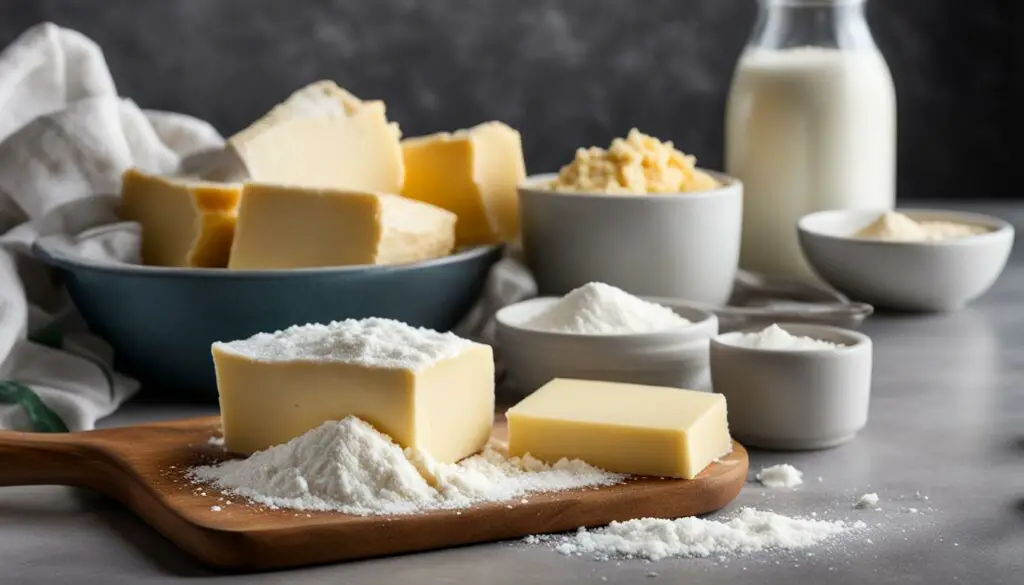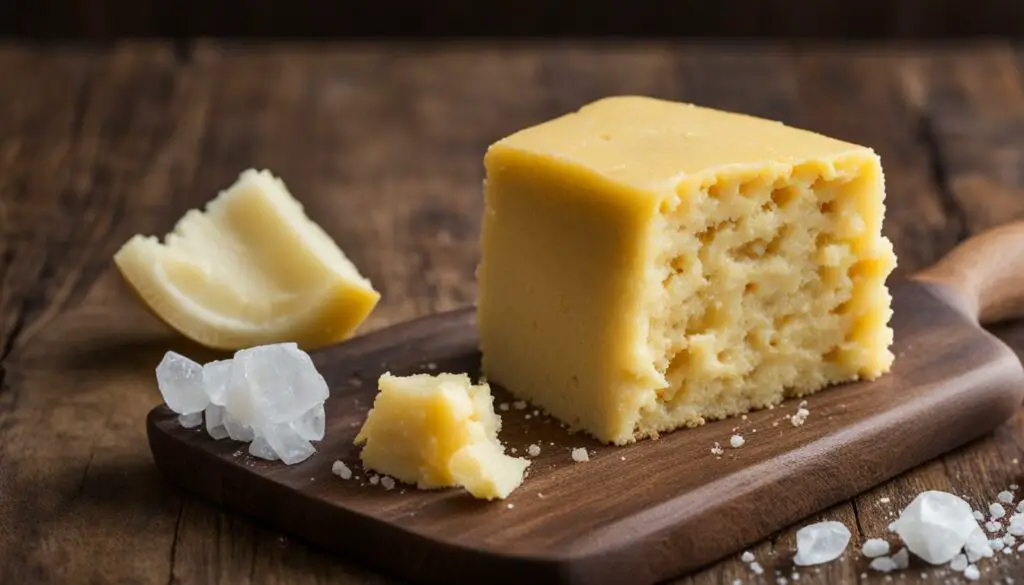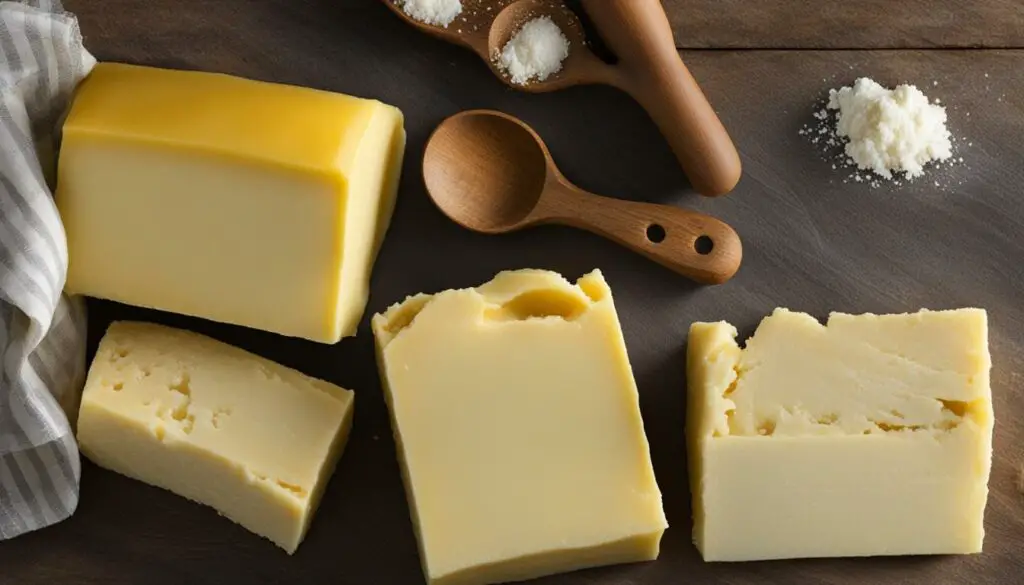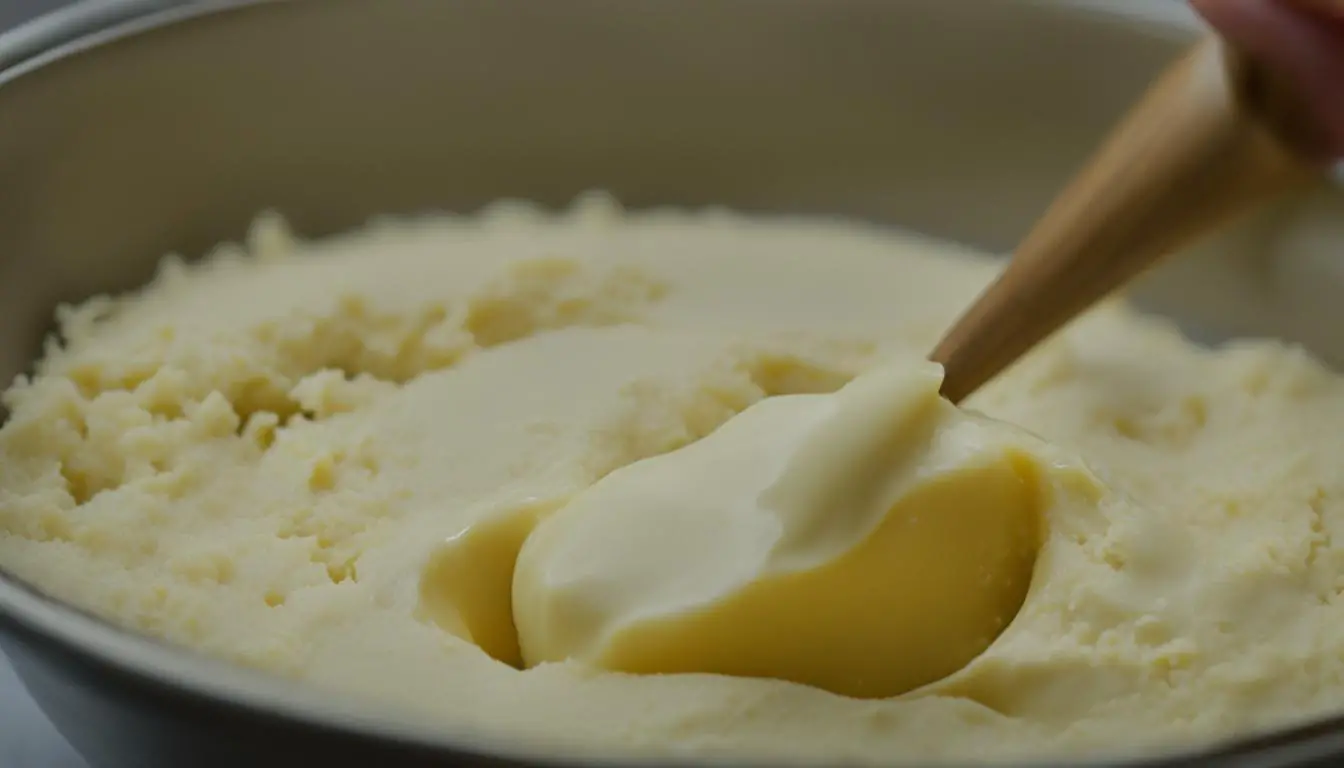Welcome to our article on the purpose of unsalted butter in cooking and why it is commonly called for in recipes. Have you ever wondered why a recipe specifies unsalted butter instead of the salted variety? Well, we’re here to unravel the mystery and help you understand the benefits of using unsalted butter in your culinary creations.
Unsalted butter plays a crucial role in recipe development, providing better control over the seasoning in your dishes. Unlike salted butter, which contains varying amounts of salt, unsalted butter allows you the freedom to add as much or as little salt as you desire. It ensures that the salt levels in the recipe are accurately measured, as the recipe assumes no other salt source. Additionally, the absence of salt in unsalted butter allows the other flavors in your dish to shine through without being masked.
Not only does unsalted butter provide better flavor control, but it is also fresher than salted butter. The salt in salted butter acts as a preservative, extending its shelf life. By using unsalted butter, you can ensure that your recipes are made with the freshest ingredients, resulting in the best possible flavor.
While unsalted butter is commonly used in baking, it can also be used in a variety of savory dishes. Its neutral taste and creamy texture make it a versatile ingredient that adds richness without overwhelming saltiness.
In the following sections, we’ll explore the differences between unsalted and salted butter in baking, substitute options for unsalted butter, the role of unsalted butter in recipe development, when to use unsalted butter in cooking, and more.
Contents
- 1 The Difference Between Unsalted and Salted Butter in Baking
- 2 Substitutes for Unsalted Butter in Recipes
- 3 The Role of Unsalted Butter in Recipe Development
- 4 When to Use Unsalted Butter in Cooking
- 5 The Flexibility of Baking with Unsalted Butter
- 6 Using Salted Butter in Baking
- 7 The Shelf Life and Freshness of Unsalted and Salted Butter
- 8 The Influence of Personal Preference on Butter Choice
- 9 Conclusion
- 10 FAQ
- 10.1 Why does a recipe call for unsalted butter?
- 10.2 What is the difference between unsalted and salted butter in baking?
- 10.3 What can I use as a substitute for unsalted butter in recipes?
- 10.4 What is the role of unsalted butter in recipe development?
- 10.5 When should I use unsalted butter in cooking?
- 10.6 What is the flexibility of baking with unsalted butter?
- 10.7 Why should I not use salted butter in recipes?
- 10.8 What is the shelf life and freshness of unsalted and salted butter?
- 10.9 How does personal preference influence butter choice?
- 11 Source Links
Key Takeaways:
- Unsalted butter provides better control over the seasoning in your recipes, allowing you to add salt to taste.
- Using unsalted butter ensures that the salt levels in the recipe are accurately measured.
- Unsalted butter is fresher than salted butter, as salt acts as a preservative.
- Unsalted butter is commonly used in baking for a more balanced and flavorful outcome.
- There are substitute options for unsalted butter, but they may alter the flavor and texture of your dishes.
The Difference Between Unsalted and Salted Butter in Baking

When it comes to baking, choosing between unsalted and salted butter can significantly impact the flavor and texture of your baked goods. Let’s explore the key differences and benefits of using unsalted butter in your recipes.
Control Over Salt
One of the main advantages of using unsalted butter in baking is the ability to have better control over the amount of salt in your recipe. Salted butter contains varying levels of salt, which can make it challenging to calibrate the overall saltiness of your baked goods. By using unsalted butter, you have the freedom to add salt according to your taste preferences, ensuring a more balanced and customized flavor profile.
Delicate Baked Goods
Unsalted butter is especially crucial in delicate baked goods like cakes and cookies, where precise measurements and subtle flavors are essential. Salted butter can introduce an uncertain level of saltiness, which may overpower the other flavors in your recipe. Using unsalted butter allows the natural flavors of the ingredients to shine through, resulting in a more nuanced and enjoyable taste experience.
Customizability
Using unsalted butter gives you the flexibility to adjust the salt levels according to your personal preference and dietary requirements. Whether you prefer a lighter touch of salt or a saltier kick, unsalted butter allows you to fine-tune the recipe to suit your taste. This level of customizability empowers you to create baked goods that perfectly match your flavor preferences.
Overall Flavor Balance
By using unsalted butter, you can achieve a more balanced flavor in your baked goods. The absence of salt in unsalted butter allows the other ingredients to harmonize naturally and shine through, resulting in a well-rounded taste profile. This balance of flavors enhances the overall enjoyment of your baked creations.
Next, we’ll explore some substitutes for unsalted butter in case you find yourself without it in your kitchen.
Substitutes for Unsalted Butter in Recipes

If you find yourself without unsalted butter on hand, there are a few substitutes you can use in your recipes. These alternatives can help you achieve similar results when unsalted butter is unavailable.
Margarine
Margarine is a suitable substitute for unsalted butter in recipes. It has a similar consistency and can be used in the same quantity as unsalted butter. However, it’s important to note that margarine may contain added salt, so adjust the amount of salt in the recipe accordingly. Additionally, margarine may have a slightly different taste compared to unsalted butter, so be aware that it may alter the flavor of your dish.
Shortening
Shortening is another alternative to unsalted butter in recipes. It provides a similar texture and can be used in the same proportion as unsalted butter. However, shortening does not have the same flavor as butter, so keep in mind that it may affect the taste of your final dish. If the recipe calls for creaming the butter, shortening may not yield the same results, as it lacks the richness of butter.
Coconut Oil
Coconut oil can also be used as a substitute for unsalted butter in some recipes. It is a plant-based alternative that works well in baking and cooking. Replace the unsalted butter with an equal amount of coconut oil in your recipe. However, it’s important to note that coconut oil has a distinct flavor that may affect the taste of your dish. It works best in recipes where the flavor of coconut complements the other ingredients.
While these substitutes can help in a pinch, it’s important to remember that they may alter the flavor and texture of your final dish. For the best flavor control and consistency in your recipes, it’s always recommended to use unsalted butter when the recipe specifically calls for it.
Summary of Substitutes for Unsalted Butter
| Substitute | Quantity | Key Considerations |
|---|---|---|
| Margarine | Same as unsalted butter | May contain added salt; may alter flavor |
| Shortening | Same as unsalted butter | Does not have the same flavor as butter; may affect texture |
| Coconut Oil | Same as unsalted butter | Has a distinct coconut flavor; best in recipes where coconut flavor complements other ingredients |
The Role of Unsalted Butter in Recipe Development
Unsalted butter plays a crucial role in recipe development, allowing chefs and bakers to have complete control over the taste and texture of their dishes. It serves as a neutral base for adding salt and other seasonings, ensuring that the flavors in the recipe are balanced and harmonious.
When developing a recipe, the purpose of unsalted butter in cooking is to provide a consistent and predictable result. Unlike salted butter, which can have varying amounts of salt, unsalted butter allows recipe developers to create recipes that can be easily replicated by others. The absence of salt in unsalted butter ensures that the salt level is not a variable factor, providing a reliable foundation for achieving the desired flavors.
Additionally, understanding the role of unsalted butter in recipe development enables chefs and bakers to have precise control over the saltiness of their dishes. By starting with unsalted butter, they have the freedom to add the desired amount of salt, allowing them to tailor the seasoning to their taste preferences and the specific requirements of the recipe.
Therefore, unsalted butter is an essential ingredient for recipe development, providing chefs and bakers with the necessary flexibility and control over the flavor profiles of their dishes.
When to Use Unsalted Butter in Cooking

Unsalted butter is a versatile ingredient that is commonly used in cooking and baking. Its distinct advantages make it an essential component in various recipes. Here are the key instances when using unsalted butter is highly recommended:
- For Precise Seasoning Control: Unsalted butter is ideal when you want complete control over the seasoning in your dishes. By using unsalted butter, you can adjust the level of salt to your taste preferences, ensuring perfectly seasoned meals.
- In Baking: Unsalted butter is especially valuable in baking, where precise measurements and adjustments are critical for successful outcomes. Baked goods like cakes, cookies, and pastries rely on the delicate balance of flavors, and unsalted butter allows these flavors to shine through without being overshadowed by excess salt.
- In Savory Dishes: While commonly associated with baking, unsalted butter also plays a significant role in savory dishes. Its rich and creamy qualities provide a luxurious base and enhance the flavors of various sauces, sautés, and gravies. The absence of excessive saltiness allows the natural taste of the ingredients to be highlighted.
Benefits of Using Unsalted Butter in Recipes
There are several benefits to using unsalted butter in your recipes:
- Flavor Control: Using unsalted butter allows you to customize the saltiness of your dishes, ensuring a balanced and nuanced taste.
- Recipe Accuracy: Unsalted butter ensures that the salt levels in the recipe are accurately measured, as it assumes no other salt source.
- Freshness: Unsalted butter is fresher than salted butter, as salt acts as a preservative.
- Showcasing Ingredients: Unsalted butter allows the natural flavors of the other ingredients to shine through, without being masked by excess salt.
Overall, when you want full control over the seasoning, to emphasize the flavors of your dish, or precisely follow a recipe, unsalted butter is the go-to choice in cooking and baking.
| When to Use Unsalted Butter in Cooking | The Benefits of Using Unsalted Butter in Recipes |
|---|---|
| In recipes where precise seasoning control is desired | Flavor control |
| In baking | Recipe accuracy |
| In savory dishes | Freshness |
| Showcasing ingredients |
The Flexibility of Baking with Unsalted Butter

Baking with unsalted butter opens up a world of culinary creativity and flexibility in the kitchen. Unlike salted butter, which already contains salt, using unsalted butter provides a blank canvas for experimenting with different flavors and seasonings. By incorporating unsalted butter into your recipes, you have complete control over the taste and seasoning, allowing you to customize and adapt your baked goods to suit your personal preferences.
One of the key benefits of using unsalted butter in recipes is the ability to create a more nuanced and delicate flavor profile. Since unsalted butter does not contain any added salt, it allows the natural flavors of the ingredients to shine through without being overwhelmed by saltiness. This enhances the overall taste of your baked goods, resulting in a more nuanced and enjoyable eating experience.
In addition to its flavor-enhancing properties, unsalted butter also offers greater flexibility when it comes to adjusting the salt levels in your recipes. By starting with unsalted butter, you have the freedom to add the precise amount of salt that your recipe requires. This is especially important in baking, where even small adjustments in salt can have a significant impact on the final outcome. With unsalted butter, you can easily achieve the perfect balance of flavors in your cakes, cookies, breads, and pastries.
To summarize, the purpose of unsalted butter in cooking is to provide a neutral base that allows for complete control over taste and seasoning. It offers a flexible and customizable approach to baking, enabling you to experiment with different flavors and adjust salt levels as needed. By using unsalted butter, you can elevate the taste and texture of your baked goods, creating delightful treats that cater to your individual palate.
| Benefits of Using Unsalted Butter in Recipes: |
|---|
| 1. Complete control over seasoning |
| 2. Allows natural flavors to shine through |
| 3. Flexibility in adjusting salt levels |
| 4. Enhanced taste and texture of baked goods |
Using Salted Butter in Baking

While unsalted butter is generally preferred in baking, there may be instances where using salted butter can work. However, it’s important to keep in mind that using salted butter may result in an unpredictable level of saltiness in the final dish. For those who prefer a more controlled flavor profile, sticking with unsalted butter is recommended.
However, if you enjoy the slightly salty and savory notes that salted butter can bring to baked goods, you can experiment with using it in moderation and adjusting the amount of added salt in the recipe accordingly. This allows you to have a balance of flavors without overpowering the other ingredients.
| Factors | Unsalted Butter | Salted Butter |
|---|---|---|
| Control over salt level | Allows for precise adjustment of saltiness | May result in an unpredictable level of saltiness |
| Flavor profile | Provides a neutral base for other flavors to shine | Brings a slightly salty and savory taste |
| Consistency | Allows for consistent results in recipes | May vary due to salt content |
As shown in the table above, using unsalted butter in baking provides more control over the salt level, flavor profile, and consistency of your baked goods. However, if you prefer the taste of salted butter and are willing to make adjustments to the recipe, you can experiment with using it in your baking.
The Shelf Life and Freshness of Unsalted and Salted Butter

Unsalted and salted butter have different shelf lives and levels of freshness. Understanding these differences can help you make informed choices when it comes to your butter selection.
Unsalted butter typically has a shorter recommended shelf life compared to salted butter. It’s best to use unsalted butter within about 1 month of purchasing and storing it in the refrigerator. The absence of salt in unsalted butter may make it more susceptible to spoilage over time.
On the other hand, salted butter has a longer shelf life due to the preservative properties of salt. It can last for over 3 months when stored properly in the refrigerator.
If you’re unsure about the freshness of your butter, there are a few indicators to look out for. Give it a sniff and check for any off odors. Fresh butter should have a sweet and creamy aroma. Discoloration or mold are signs that the butter has gone bad and should not be consumed.
By using butter within its recommended timeframe and storing it properly, you can ensure that you’re using fresh and flavorful butter in your recipes.
| Unsalted Butter | Salted Butter | |
|---|---|---|
| Shelf Life | About 1 month | Over 3 months |
| Recommended Storage | Refrigerator | Refrigerator |
| Signs of Spoilage | Off odors, discoloration, mold | Off odors, discoloration, mold |
The Influence of Personal Preference on Butter Choice
When it comes to choosing between unsalted and salted butter, personal preference plays a significant role. Each type of butter offers distinct qualities that cater to different taste preferences and cooking styles.
Some individuals prefer the convenience and added flavor that salted butter brings to their dishes. Salted butter is readily available and can add a savory touch to both sweet and savory recipes. It provides an instant burst of flavor, making it a popular choice for spreading on toast or melting over steamed vegetables.
On the other hand, many value the control and flexibility offered by unsalted butter. With unsalted butter, you have the freedom to adjust the salt levels in your recipes according to your taste. This is particularly crucial in delicate recipes like pastries or desserts, where precise measurements are essential for achieving the perfect balance of flavors.
When making your butter choice, it’s important to consider your own taste preferences and the specific requirements of the recipe. Do you prefer a more pronounced saltiness in your dishes, or do you enjoy the ability to fine-tune the seasoning? Are you baking a cake or making a savory sauce? These factors will guide you towards the most suitable butter option.
Experimentation and customization are key in the kitchen. Feel free to explore various options and find the perfect balance of flavors for your dishes. Whether it’s the convenience of salted butter or the precision of unsalted butter, the decision ultimately rests in your hands.
Conclusion
Unsalted butter plays a vital role in many recipes, offering chefs and bakers the ability to control the flavors in their dishes with precision. By using unsalted butter, the seasoning can be calibrated to taste, resulting in a well-balanced and harmonious flavor profile. This is especially important in baking, where even the smallest adjustments can significantly impact the final outcome.
The benefits of using unsalted butter in recipes extend beyond flavor control. Unsalted butter is fresher compared to its salted counterpart, as the absence of salt eliminates the need for preservatives. Additionally, unsalted butter allows the flavors of other ingredients to shine through without being masked by excess saltiness, making it the preferred choice in delicate baked goods like cakes and cookies.
Knowing when to use unsalted butter in cooking is key to achieving the desired results. While it is commonly used in baking, unsalted butter can also be utilized in savory dishes for its rich and creamy qualities. However, it’s important to keep in mind that personal preference and recipe requirements play a significant role in choosing whether to use unsalted or salted butter.
FAQ
Why does a recipe call for unsalted butter?
Unsalted butter is called for in recipes for several reasons. It allows for better control over the seasoning in your dishes, ensures accurate salt measurement, and is fresher than salted butter.
What is the difference between unsalted and salted butter in baking?
Unsalted butter allows for more control over the amount of salt in the recipe, resulting in a more balanced and flavorful final product.
What can I use as a substitute for unsalted butter in recipes?
Margarine, shortening, or coconut oil can be used as alternatives to unsalted butter, although they may alter the flavor and texture of the final dish.
What is the role of unsalted butter in recipe development?
Unsalted butter serves as a neutral base for adding salt and other seasonings, ensuring balanced and harmonious flavors in the recipe.
When should I use unsalted butter in cooking?
Unsalted butter is recommended in recipes where precise control over the seasoning is desired, especially in baking.
What is the flexibility of baking with unsalted butter?
Baking with unsalted butter allows for greater control over flavor customization and enhances the overall taste of the baked goods.
Why should I not use salted butter in recipes?
Salted butter can result in an unpredictable level of saltiness in the final dish.
What is the shelf life and freshness of unsalted and salted butter?
Unsalted butter has a shorter shelf life of about 1 month in the refrigerator, while salted butter can last for over 3 months due to the preservative effect of salt.
How does personal preference influence butter choice?
The choice between unsalted and salted butter ultimately depends on personal preference and the specific requirements of the recipe.









